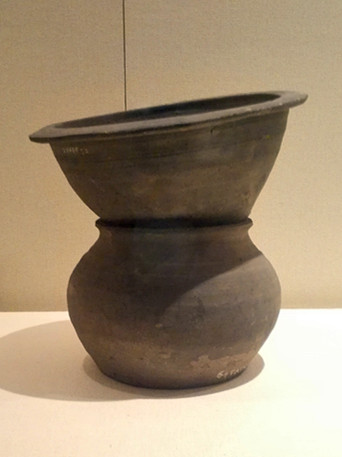He paid no attention to the earthen jug that had fallen to the ground and broken.(墮甑不顧)
There was a famous minister in the Eastern Han Dynasty of China, his name was (Guo Tai), and a story about him is recorded in the history books.
One day, as he was walking along the road, he saw a young man coming towards him. The young man was carrying a large earthen pot on his back.
He saw that the young man suddenly stumbled and the earthen pot the young man was carrying fell to the ground and immediately broke into several pieces.
The young man got up, brushed the dust off his clothes and continued walking. The young man ignored the broken pot. The young man's face was very calm.
When the young man passed (Guo Tai), (Guo Tai) took the initiative to talk to the young man.
(Guo Tai) said
Hello, my name is (Guo Tai), and what is your name?
the young man replied.
Hello, my name is (Meng Shuda).
(Guo Tai) said.
I would like to ask you a question.
I saw you stumble a few minutes ago, and the earthenware jug you were carrying fell to the ground and broke.
But why don't I see any remorse on your face? Why do you seem so indifferent to this matter?
replied the young man with a smile.
After I stumbled, when I got up, I saw that the jar I was carrying was broken.
I know that no matter how much I blame myself in my heart, and no matter how remorseful I feel, I can never restore that earthen pot to its original state.
I face this reality and I choose to face it.
I think instead of regretting it all the time, I'd better hurry up and buy a new one.
(Guo Tai) thinks this young man is very special.
He later helped him to study and recommended the young man to work in the central government of the Eastern Han Dynasty.
The direct translation of this saying is that he did not pay attention to the earthen jug that fell to the ground and was broken.
This idiom is used to describe a person who does not waste time on mistakes that have already happened. This person accepts reality and faces it.
Dear friend, what inspirations or thoughts do you have after listening to this story?
Do you still have regrets in your heart because of the mistakes you have made in your life? Do you think you should continue to live in regret?
I hope this story can give you some new insights.
墮甑不顧(He paid no attention to the earthen
jug that had fallen to the ground and broken.)
中國的東漢王朝有一個著名的大臣,他的名字叫做(郭泰),歷史書上記載了一個他的故事。
有一天,他走在路上的時候看見迎面走來一個年輕人,這個年輕人揹著一個大瓦罐。
他看到這個年輕人突然絆倒,這個年輕人揹著的那個瓦罐掉到地上並且立即碎裂成好幾塊。
這個年輕人從地上爬起來後拍拍衣服上的灰塵後就繼續向前走,這個年輕人不理會那個碎裂的瓦罐,這個年輕人的的臉上非常平靜。
這個年輕人走過(郭泰)身邊的時候,(郭泰)主動與這個年輕人攀談。
(郭泰)說。
您好,我的名字是(郭泰),請問您叫甚麼名字。
這個年輕人回答。
您好,我的名字是(孟叔達)。
(郭泰)說。
我想請問你一個問題。
我幾分鐘前看見你不小心絆倒了,你揹著的那個瓦罐掉到地上碎裂了。
但是為何我在你的臉上看不到悔恨,你為何好像完全不在意這件事情。
這個年輕人笑著回答。
當我絆倒之後,我從地上爬起來時就已經看到我揹的那個瓦罐已經碎裂了。
我知道我的內心再自責,我感覺再懊悔我也不可能讓那個瓦罐恢復原樣。
我正視這個現實並且選擇面對這個現實。
我認為與其我時間懊悔,我不如趕緊去買一個新的。
(郭泰)覺得這個年輕人真的很特別。
他後來就幫助他求學並推薦這個年輕人進入東漢王朝的中央政府工作。
這句成語直接翻譯的意思是他不關注那個掉在地上並且已經碎裂的瓦罐。
這句成語被用來形容一個人不因為浪費時間在已經發生的錯誤上,這個人接受並且面對現實。
親愛的朋友,你聽完這個故事有怎樣的啟發或有怎樣的想法呢。
你的內心還在因為人生中曾經犯過的那些錯誤而後悔嗎?你認為你的人生要持續活在後悔中嗎?
我希望這故事能讓你產生一些新的收穫。
出處為後漢書-卷98-列傳58-孟敏傳
https://ctext.org/wiki.pl?if=gb&chapter=933544
2024/12/19更新

